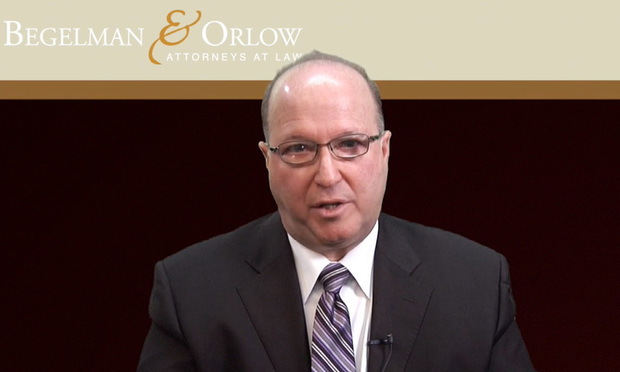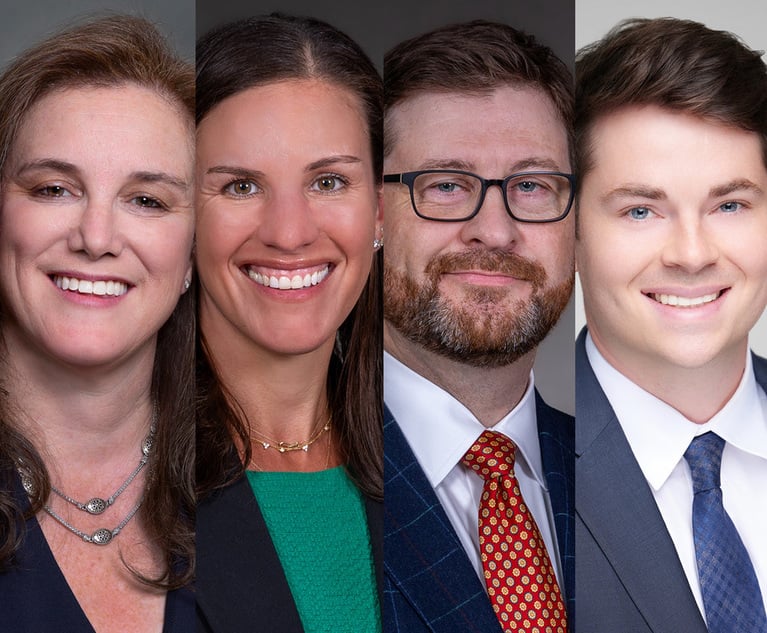Law Firm Can't Bill Defecting Lawyer for Marketing Purge
But Begelman & Orlow, with offices in Cherry Hill, New Jersey, and Conshohocken, was not required to remove the back of the lawyer's head from one video, saying the law does not concern itself with "trifles."
July 09, 2019 at 05:01 PM
4 minute read
The original version of this story was published on New Jersey Law Journal
 Ross Begelman of Begelman & Orlow. Courtesy video image.
Ross Begelman of Begelman & Orlow. Courtesy video image.
A New Jersey appeals court has ordered a law firm based in South Jersey and Pennsylvania to refund $1,250 it charged a former partner who asked to be taken out of its promotional videos, but the judges had less sympathy for the lawyer's request to delete a scene depicting the back of his head, saying the court does not involve itself in “trifles.”
The Superior Court's Appellate Division said the firm can't stick its former partner with a portion of the cost of removing his name and likeness from a marketing video, but also found the departing lawyer's right to have his image scrubbed from his former firm's marketing videos does not extend to one offering only a glimpse of the back of his head.
The dispute over promotional videos arose between attorney Paul Melletz and the firm formerly known as Begelman, Orlow & Melletz. After nine years at the firm, Melletz resigned in January 2017 and later filed a suit claiming the firm failed to repay loans he made to his fellow partners. The firm, now known as Begelman & Orlow, has offices in Cherry Hill, New Jersey, and Conshohocken, and lists four lawyers on its website.
Melletz and his former firm entered a consent order in March 2017 requiring it to remove from its website any reference to Melletz, any images of him, and to cease using his name in any way. In June 2018, Melletz filed a motion to enforce litigant's rights, seeking the removal of his name and image from the firm's website.
Begelman & Orlow said that the cost of removing Melletz from its videos would cost $2,500, and Judge Janet Smith, in Burlington County Superior Court, ruled that Melletz and the firm should each pay $1,250. Smith also rejected Melletz's request that the firm edit the portion of a video showing the back of his head.
On appeal, Judges Joseph Yannotti and Robert Gilson said Smith's decision to split the cost of editing the videos was inconsistent with the consent order, which is, in essence, an agreement between the parties. In the consent order, the defendant agrees to remove all references to the plaintiff from its website, without any requirement that the plaintiff share in the editing cost, the judges said. Accordingly, they reversed that provision and ordered the firm to refund Melletz's $1,250.
But Yannotti and Gilson said Smith did not abuse her discretion in denying the plaintiff's request for removal of a video showing the back of his head. That segment of the video shows a man sitting at a conference table with several other people. The focus is on another lawyer sitting across the table. No mention of Melletz's name is made, and he is not identified as a member of the firm. The viewer can see “the back of a man's head, his left ear, a portion of his left cheekbone, a portion of his glasses, and his left shoulder. No facial features are shown, so that most people are unlikely to recognize Melletz,” the appeals court said.
“Accordingly, the trial court was correct in denying plaintiff's request under the doctrine of de minimis non curat lex, or 'the law does not concern itself with trifles,'” Yannotti and Gilson wrote.
When Melletz left the firm, he joined a Mount Laurel, New Jersey, outfit now known as Gerstein, Grayson, Cohen & Melletz. His suit against his former firm claimed it failed to repay him $225,000 that he loaned it. Smith granted partial summary judgment to Melletz on the loans in November 2017.
Melletz, who represented himself in the litigation, did not return a call about the case. Regina Poserina of Begelman & Orlow, who represented her firm, also did not respond to a request for comment.
This content has been archived. It is available through our partners, LexisNexis® and Bloomberg Law.
To view this content, please continue to their sites.
Not a Lexis Subscriber?
Subscribe Now
Not a Bloomberg Law Subscriber?
Subscribe Now
NOT FOR REPRINT
© 2025 ALM Global, LLC, All Rights Reserved. Request academic re-use from www.copyright.com. All other uses, submit a request to [email protected]. For more information visit Asset & Logo Licensing.
You Might Like
View All


Trending Stories
- 1Starbucks Sues Ex-Executive to Recover $1M Signing Bonus
- 2Navigating AI Risks: Best Practices for Compliance and Security
- 320 New Judges? Connecticut Could Get Wave of Jurists
- 4Orrick Loses 10-Lawyer Team to Herbert Smith in Germany
- 5‘The US Market Is Critical’: KPMG’s Former Head of Global Legal Services On the Legal Arm of the Big Four Firm Entering the US
Who Got The Work
J. Brugh Lower of Gibbons has entered an appearance for industrial equipment supplier Devco Corporation in a pending trademark infringement lawsuit. The suit, accusing the defendant of selling knock-off Graco products, was filed Dec. 18 in New Jersey District Court by Rivkin Radler on behalf of Graco Inc. and Graco Minnesota. The case, assigned to U.S. District Judge Zahid N. Quraishi, is 3:24-cv-11294, Graco Inc. et al v. Devco Corporation.
Who Got The Work
Rebecca Maller-Stein and Kent A. Yalowitz of Arnold & Porter Kaye Scholer have entered their appearances for Hanaco Venture Capital and its executives, Lior Prosor and David Frankel, in a pending securities lawsuit. The action, filed on Dec. 24 in New York Southern District Court by Zell, Aron & Co. on behalf of Goldeneye Advisors, accuses the defendants of negligently and fraudulently managing the plaintiff's $1 million investment. The case, assigned to U.S. District Judge Vernon S. Broderick, is 1:24-cv-09918, Goldeneye Advisors, LLC v. Hanaco Venture Capital, Ltd. et al.
Who Got The Work
Attorneys from A&O Shearman has stepped in as defense counsel for Toronto-Dominion Bank and other defendants in a pending securities class action. The suit, filed Dec. 11 in New York Southern District Court by Bleichmar Fonti & Auld, accuses the defendants of concealing the bank's 'pervasive' deficiencies in regards to its compliance with the Bank Secrecy Act and the quality of its anti-money laundering controls. The case, assigned to U.S. District Judge Arun Subramanian, is 1:24-cv-09445, Gonzalez v. The Toronto-Dominion Bank et al.
Who Got The Work
Crown Castle International, a Pennsylvania company providing shared communications infrastructure, has turned to Luke D. Wolf of Gordon Rees Scully Mansukhani to fend off a pending breach-of-contract lawsuit. The court action, filed Nov. 25 in Michigan Eastern District Court by Hooper Hathaway PC on behalf of The Town Residences LLC, accuses Crown Castle of failing to transfer approximately $30,000 in utility payments from T-Mobile in breach of a roof-top lease and assignment agreement. The case, assigned to U.S. District Judge Susan K. Declercq, is 2:24-cv-13131, The Town Residences LLC v. T-Mobile US, Inc. et al.
Who Got The Work
Wilfred P. Coronato and Daniel M. Schwartz of McCarter & English have stepped in as defense counsel to Electrolux Home Products Inc. in a pending product liability lawsuit. The court action, filed Nov. 26 in New York Eastern District Court by Poulos Lopiccolo PC and Nagel Rice LLP on behalf of David Stern, alleges that the defendant's refrigerators’ drawers and shelving repeatedly break and fall apart within months after purchase. The case, assigned to U.S. District Judge Joan M. Azrack, is 2:24-cv-08204, Stern v. Electrolux Home Products, Inc.
Featured Firms
Law Offices of Gary Martin Hays & Associates, P.C.
(470) 294-1674
Law Offices of Mark E. Salomone
(857) 444-6468
Smith & Hassler
(713) 739-1250






